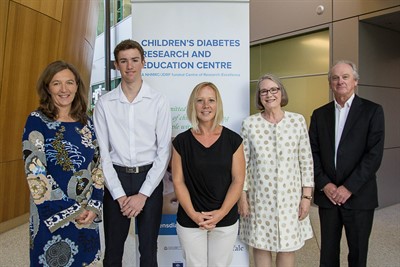Search

News & Events
Major focus for children’s diabetes research in WALaunch of the WA Children's Diabetes Research and Education Centre for Research Excellence (CRE) on the eve of World Diabetes Day.
News & Events
Older maternal age linked to mental health symptoms in daughtersResearchers at The Kids Research Institute Australia have found daughters born to older mothers have higher rates of some mental health problems.

News & Events
Community Lecture: Personalised Medicine, the new frontierAt this special Telethon Kids Institute lecture, Professor Leroy Hood will share his career journey and talk about the emergence of personalised medicine.

News & Events
Less ‘fast food’ outlets near schools could help reduce obesityTeaching a class of year eleven students about nutrition ten years ago is what gave Dr Gina Trapp the idea for her research.


News & Events
Folate success helps Aboriginal kidsMore than 30 years of research into the links between folate and neural tube defects has paid off for The Kids Research Institute Australia researcher Professor Carol Bower.
News & Events
Tackling FASD in youth in detentionResearchers at The Kids for Child Health Research have been awarded more than $1.4M to assess how many juvenile offenders are affected by FASD.

News & Events
Youth Health reportResearch for the Commissioner for Children & Young People seeking the views of >1,000 young people about their experiences accessing/using health services
News & Events
New blueprint for child health researchDelivering tangible and measurable improvements to the health and wellbeing of children is at the centre of a bold new blueprint for child health research in WA
News & Events
Ependymoma Awareness DayEthan was not even two when he was diagnosed with a rare type of brain tumour known as an ependymoma.
